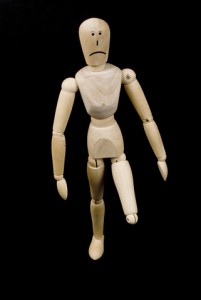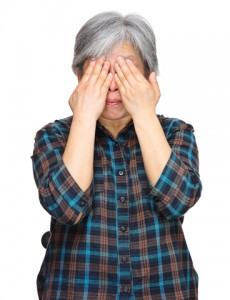
While there are hundreds if not thousands of different phobias there are just a relatively small number of physical and mental symptoms. We will now take a look at the symptoms of phobias which many readers will recognise.
Common phobia symptoms
As we have mentioned in previous articles, it is the body’s way in which it interprets a perceived “danger” which prompts the natural fight or flight reaction. Where phobias are involved, despite the fact there is no real threat only a perceived threat, the body very often goes into flight mode. This can surface through an array of phobia symptoms such as:-
- Uncontrolled anxiety
Whether you are frightened of flying, scared of spiders or have a fear of crowds, when faced with the source of your fear this can prompt terrifying and uncontrolled anxiety. Often described as panic attacks, they can lead to accelerated heartbeat and an array of other physical symptoms which are “real”. Many people have a natural reaction to return to a place of safety which may be your home, car or even place of work.
- A need to vacate the area
One of the common symptoms of phobias is the need to vacate the area in which your fear/phobia is located. In some cases this can lead to an uncontrolled reaction which can in some circumstances put the individual in harm’s way such as running across roads, etc. The fear of everyday things such as moving cars is for that split second forgotten and the need to get away from your phobia/fear takes over.
- Loss of bodily control
As you would expect, when faced with one of your greatest fears you can for a split second “lose your mind”. Many of those who experience common phobia symptoms are unable to recollect that short time between spotting their fear and the need to flee the area. In simple terms this is the body’s fight or flight reaction kicking in and overrunning all other thoughts and bodily functions. Indeed we have seen some people experience a type of paralysis when faced with their darkest fears.
- An inability to fight irrational thoughts
The whole context of phobias is based upon a fear which is irrational, unreasonable and in many cases exaggerated. Even though the fear of their phobia is their biggest concern at the time, all phobia sufferers will talk about the fact they know their fear is irrational but they can do nothing about it. One therapist suggested this was because the “internal workings of the brain have become confused” and the way to solve it is to “rewire your brain”. This is obviously in theoretical terms but it does give you an idea of how you can change your behaviour and your reaction to certain scenarios.
Panic and anxiety
Phobias, panic and anxiety are three physical/mental reactions which often go hand-in-hand. While some people suggest that phobias are “in your mind” but how can this be when they prompt a real physical reaction?
Some of the common physical reactions with regards to phobias, panic and anxiety include:-
- Sweating
When your body becomes aroused, excited or scared this prompts the release of stress hormones which are connected to sweating. When you consider that sweating is simply a means of reducing your body temperature it is useful when fighting phobias/anxiety. However, it can be very uncomfortable.
- Abnormal breathing
Anxiety is your body’s natural way of responding to fear although if left to continue for a considerable time it can have a serious impact upon your breathing pattern. Therefore, it is not difficult to see why those suffering phobia/anxiety often report shortness of breath.
- Faster heartbeat
Any form of stress or anxiety will increase your heartbeat as it looks to pump more blood around the body to enact defence mechanisms. Those who suffer an accelerated heartbeat as a consequence of phobias very often report a feeling as if their heart is leaving their chest.
- Trembling with fear
Many people fail to understand the reason why we tremble especially when faced with fear or excitement. This is a purely physical reaction because in this situation the brain will introduce a greater level of adrenaline which can lead to muscles twitching uncontrollably – which materialises as physical trembles.
- Hot flushes/chills
During periods of anxiety your blood vessels will tense up and reduce in size to allow your body to pump blood into areas which are “on the front line”. This causes your body temperature to increase thereby creating hot flushes and chills.
- Choking sensation
While there is no condition which can explain the often mentioned choking sensation felt by phobia/anxiety sufferers, there may be a reason. During periods of high anxiety people can become hypersensitive leading to a slight constriction of their throat. This can prompt a feeling of choking which in itself causes more anxiety and exacerbates the problem.
- Chest pains
Chest pains and tightness are very closely related to anxiety which can cause muscles to contract at a rapid rate. This then prompts a feeling of chest pain/tightness which increases anxiety and increases the contractions. In what can sometimes become a vicious circle, the level of pain can continue to rise and rise.
- Butterflies in the stomach
When experiencing a phobia reaction or degree of anxiety your body will release an array of different hormones. This will prompt your heart to target certain areas of your body for increased blood flow while reducing the flow to other areas such as your digestive system. This short-term drop in blood pressure is what leads to the fluttering sensation in your stomach often described as butterflies.
- Pins and needles sensation
Pins and needles tend to occur when your nerves have been under pressure and then suddenly released. It is your body sending a wake-up signal which can also occur during anxiety attacks. It is the body’s way of literally waking up your nervous system to ensure that you are ready to react to the forthcoming fight or flight scenario.
- Dry mouth syndrome
As you will see from descriptions of all the above symptoms, it is very often anxiety which creates these scenarios. When it comes to dry mouth syndrome, this is strongly connected to anxiety/phobias which can make the body susceptible to acid reflux. In simple terms this leads to the creation of less saliva which in turn prompts a feeling of dry mouth.
- Confusion/disorientation
Many people report confusion/disorientation when undergoing a reaction to a phobia or increased anxiety. This is directly related to the way in which the brain responds to an oncoming fight or flight scenario. Your brain will quickly send very strong signals to your body’s motor functions in readiness to take action. These strong signals can cause momentary confusion/disorientation as the body’s fight or flight system literally takes over everything.
- Nausea
Nausea is often a by-product of your brain preparing your body for a fight or flight reaction. Neurotransmitters can very often find their way into the digestive tract thereby upsetting the balance of your gut which can prompt nausea.
- Dizziness
Scientists believe that the areas of your brain which cater for anxiety and dizziness are very closely connected. As a consequence, a bout of anxiety can in some circumstances impact the other area of your brain which controls balance and feelings of dizziness. So, it is not uncommon to experience dizziness during a bout of anxiety.
- Headaches
Those who have suffered a phobia reaction/anxiety will be well aware of the pounding headaches this can create. There are many reasons why you may experience headaches during anxiety/phobia episodes but this is probably mainly related to tension/tensing by your body. This can cause severe exhaustion and restricted blood flow which together can lead to throbbing headaches.
Summary
While phobias and anxiety are very closely related, scientists and doctors now know more about these two conditions than ever before. We know how the body reacts, the potential side-effects and the fact that even though we know this feeling is irrational, it is difficult if not impossible to control at the time. The idea that we need to “rewire our brains” sounds brutal but it is actually akin to learning a new skill/reaction. Teaching your body how to react to various scenarios is something which becomes automatic over time and therefore there is reason to be hopeful about beating/controlling your phobias and anxiety going forward.






